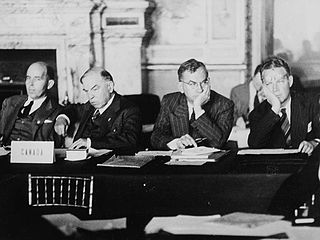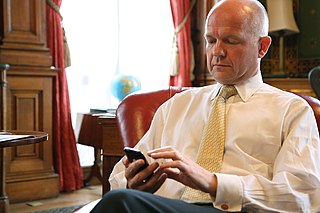
Argeo Paul Cellucci was an American politician and diplomat from Massachusetts. A Republican, he served in the House of Representatives and Senate of Massachusetts, was state's lieutenant governor, a position he held from 1991 to 1997 under Governor Bill Weld.
In international relations, public diplomacy or people's diplomacy, broadly speaking, is any of the various government-sponsored efforts aimed at communicating directly with foreign publics to establish a dialogue designed to inform and influence with the aim that this foreign public supports or tolerates a government’s strategic objectives. As the international order has changed over the 20th century, so has the practice of public diplomacy. Its practitioners use a variety of instruments and methods ranging from personal contact and media interviews to the Internet and educational exchanges.
Jamsheed Marker, Hilal-e-Imtiaz Award Award, was a Pakistani diplomat with a 42-year diplomatic career. He was notable for his tenure as Ambassador to the United States, serving from 17 September 1986 to 30 June 1989 during the administrations of Prime Ministers Muhammad Khan Junejo and Benazir Bhutto. He claimed to have 'helped' negotiate the Soviet military withdrawal from Afghanistan.
Diplomatic rank is a system of professional and social rank used in the world of diplomacy and international relations. A diplomat's rank determines many ceremonial details, such as the order of precedence at official processions, table seatings at state dinners, the person to whom diplomatic credentials should be presented, and the title by which the diplomat should be addressed.
Cultural diplomacy is a type of public diplomacy and soft power that includes the "exchange of ideas, information, art, language and other aspects of culture among nations and their peoples in order to foster mutual understanding". The purpose of cultural diplomacy is for the people of a foreign nation to develop an understanding of the nation's ideals and institutions in an effort to build broad support for economic and political goals. In essence "cultural diplomacy reveals the soul of a nation", which in turn creates influence. Though often overlooked, cultural diplomacy can and does play an important role in achieving national security efforts.

Thomas Reeve "Tom" Pickering is a retired United States ambassador. Among his many diplomatic appointments, he served as U.S. Ambassador to the United Nations from 1989 to 1992.

Arnold Danford Patrick Heeney, was a Canadian lawyer, diplomat and civil servant.
Assistant Secretary of State (A/S) is a title used for many executive positions in the United States Department of State, ranking below the Under Secretaries. A set of six Assistant Secretaries reporting to the Under Secretary for Political Affairs manage diplomatic missions within their designated geographic regions, plus one Assistant Secretary dealing with international organizations. Assistant Secretaries usually manage individual bureaus of the Department of State. When the manager of a bureau or another agency holds a title other than Assistant Secretary, such as "Director," it can be said to be of "Assistant Secretary equivalent rank." Assistant Secretaries typically have a set of deputies, referred to as Deputy Assistant Secretaries (DAS).

A consul is an official representative of the government of one state in the territory of another, normally acting to assist and protect the citizens of the consul's own country, and to facilitate trade and friendship between the people of the two countries.

The Elliott School of International Affairs is the professional school of international relations, foreign policy, and international development of the George Washington University, in Washington, D.C. It is highly ranked in international affairs and is the largest school of international relations in the United States.

Livingston Tallmadge Merchant was a United States official and diplomat. He twice served as United States ambassador to Canada and was Under Secretary for Political Affairs from 1959 to 1961.
In the Commonwealth of Nations, a high commissioner is the senior diplomat in charge of the diplomatic mission of one Commonwealth government to another. Instead of an embassy, the diplomatic mission is generally called a high commission.
Clientitis is the alleged tendency of resident in-country staff of an organization to regard the officials and people of the host country as "clients". This condition can be found in business, military, or government. The term clientitis is somewhat similar to the phrases "gone native" or "going native", and may have its origins in the 19th Century when small diplomatic missions were staffed by long-term expatriates with distant connections to their home country. 20th and 21st Century rapid communication with home ministries, and frequent rotations of staff, make the term anachronistic and less relevant in modern diplomatic context.

George Walter Landau was an American diplomat who served as the United States Ambassador to Paraguay, Chile, and Venezuela.
The term Facebook diplomacy was coined sometime in October 2008 in casual notes exchanged on Twitter, in connection to U.S. President Barack Obama's electoral political campaign's keen use of Facebook and other social network websites. The term Facebook diplomacy was further introduced and elaborated to describe the potential 'soft power' that can be created with Internet social networking tools like Facebook to counter terrorism, and interfere with repressive governments and militant groups in a discussion at a social networking and technology conference in December 2008 in New York.
During the December conference in New York, the United States Undersecretary of Public Diplomacy, James Glassman said, "New technology gives the United States and other free nations a significant advantage over terrorists." In his presentation at New York's Columbia University Law School, he went on to illustrate how Facebook diplomacy and on-line activism created success through the use of Facebook groups and the use of the platform to create activism and cause global awareness relative to issues in Colombia against the infamous FARC rebels.

Diplomacy is the art and practice of conducting negotiations between representatives of states. It usually refers to the conduct of international relations through the intercession of professional diplomats with regard to a full range of topical issues. Diplomacy entails influencing the decisions and conduct of foreign governments and officials through dialogue, negotiation, and other nonviolent means.

Twitter diplomacy, also "Twiplomacy" or "hashtag diplomacy", is the use of social media website, Twitter, by heads of state, leaders of intergovernmental organizations (IGOs), and their diplomats to conduct diplomatic outreach and public diplomacy.

The United States Advisory Commission on Public Diplomacy (ACPD), created in 1948, is tasked by Congress with "appraising U.S. Government activities intended to understand, inform, and influence foreign publics and to increase the understanding of, and support for, these same activities." The commission is supported by the Office of the Under Secretary of State for Public Diplomacy and Public Affairs, and reports to the President, Secretary of State, and Congress. Its current charter authorizes the Commission through fiscal year 2020.









